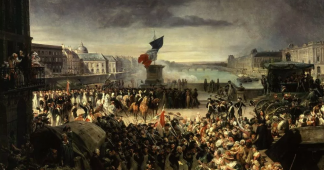Piaf in technicolor singing an anthem of the Women’s March on Versailles, a signficant event in French Revolution. No longer the mournful tragedienne in black and white with tales of love and heartbreak, rather a spirited revolutionary singing boldly with brio and conviction, “The aristocrats to the lamp posts.” It was the aristocrats who brought street lamps to Paris, now the people would see them hanging from them. The women stormed Versailles, demanding simply bread, which had been limited and overpriced for the people, while the royalty threw great banquets for themselves.
For the historical background of this song, go here:
http://en.wikipedia.org/wiki/Women%27…
https://www.youtube.com/watch?v=35Unk…
The” Ca Ira” was said to be inspired by Benjamin Franklin, then ambassador to France, who was asked how the American Revolution fared. He answered in the best French he could muster, “Ca Ira, Ca Ira.” meaning ” It’ll be fine, It’ll be fine.” It ‘ll go well. The song was written by a street singer and became a popular work song in 1790. It endured past its time to became a song of revolution that could have easily been parodied at Occupy encampments. This clip is from a 1953 film produced by Sasha Guitry, “Si Versailles M’Etait Conté” (If Versailles Told me its Story). Imagine the palace of Versailles, home to French royalty since Louis XIII , laden with gold , marble, and crystal chandeliers, its fountains, manicured gardens, with Piaf hanging from the gates, supported by a ladder, singing her heart out, the poor people of France, storming the palace gates. There are many versions of this song. In one, not only do they hang the aristocrats, they stick a shovel up their asses. Thanks to philipchek for turning me on to this song , explaining its historical background and for help translating it.











